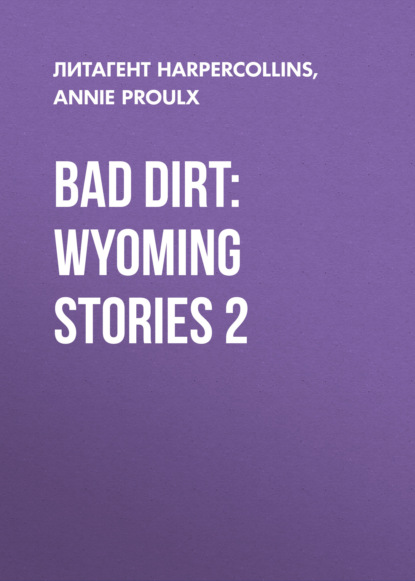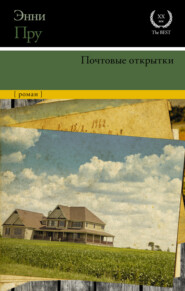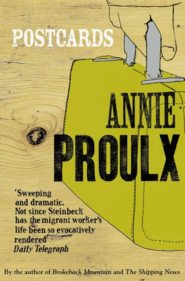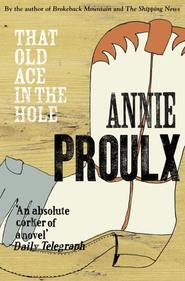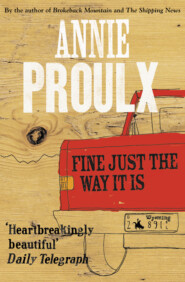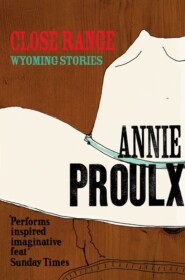По всем вопросам обращайтесь на: info@litportal.ru
(©) 2003-2024.
✖
Bad Dirt: Wyoming Stories 2
Автор
Год написания книги
2019
Настройки чтения
Размер шрифта
Высота строк
Поля
He increased his storage space, stacking his father’s papers and books in the back of a deep closet. He added his own legal junk, the boxes jammed high and tight.
He made money all through the Depression. Others in Natrona County got rich as well. While the rest of the country was suffering dust storms and bread lines, Casper enjoyed a flood of oil profits. It set off a building boom. The Brawls Commercial was no longer the premier structure in the town.
In 1939 Archibald Brawls bought a ranch north of Casper—the former property of Bucklin, whom he had counseled in the Teapot Dome affair—and on weekends began to live the life of a distinguished rancher. It pleased him to improve his herd with pedigreed stock. The property was mostly yardang and trough, the tops of the ridges shaved smooth by eons of westerlies. It lay just on the northern edge of the great wind corridor that sweeps the state from the Red Desert to the Nebraska border. But, although Brawls and his wife, Kate, a blond with a face she had clipped from a magazine and the caramel eyes of a lizard, entertained important politicians and ranchers, although their New Year’s galas and Fourth of July ranch barbecues were great events in Wyoming society, somehow their lives were tragic. Brawls wanted to build up a ranch kingdom with his boys, but his oldest son, Vivian, was killed in the Second World War. Basford, the second son, who was something of a drinker, steered his Ford into a fatal draw and died alone in the sagebrush. Then Kate sued for divorce, moved to Denver, and remarried a podiatrist. The third son, Sage, graduated from Boston University Law School in 1959 and joined his father’s practice. He always wore a suit, in contrast to his father’s boots, twill pants, and many-pocketed vest.
“Somebody in this outfit has to look like a lawyer,” he joked.
Archibald raised one eyebrow, exposed his cold teeth. “You still don’t know, even at your age, that it’s ranching interests run this state? They come to us because they recognize”—and here he hooked a thumb in his vest armhole, omnipresent cigarette dribbling ash down the front—“that we know their problems.” He adjusted his Stetson, which like a Texas sheriff, he always wore in the office.
Clients saw how strongly the Brawls men resembled one another, compared the framed photograph of Gay G. Brawls that hung in the anteroom with the living examples of Archibald and Sage. They were all rangy, all with heavy dark beards that showed immediately after they shaved, all too tall for doorways. When finally Archibald Brawls died of lung cancer in 1962, the year lightning demolished the stubby spout of Teapot Dome, his Sinclair stock and his holdings in the oil-rich Salt Creek fields north of Casper had made him wealthy. The son, Sage, inherited the ranch, the law practice, the money.
Sage Brawls, after a notorious period of wild-oats sowing, married Georgina Crawshaw of Wheatland, fifteen years younger than he. Her great-grandfather, Waile Crawshaw, had been known throughout the west as a sharp judge of horseflesh. In 1910 he had bought dozens of fine thoroughbreds for the proverbial song in New York when that state moved against horse racing and the thoroughbred market crashed. He shipped them to Wyoming and bred them to his polo ponies. His children continued the business, and Crawshaw mounts played on the polo fields of the world.
Georgina, raised on the family ranch, was as blond as Sage’s mother, but thin and athletic, with a body like that of a strong boy. She had big, wiry hands and bit her thumbnails. It was she who introduced Sage to polo and crossword puzzles.
They had no children, and perhaps this accounted for the ossification of Sage’s interests and character. As a child he had had an inquiring mind, had caught snowflakes on a piece of black velvet, wondered how many lodgepole pollen grains were in the yellow mountain clouds of summer, worked mathematical puzzles. But Georgina won him over to polo, and within a few years he thought of little else. The crosswords were too much for him.
Like many who admire horses, Sage Brawls let his affection become an obsession. He loved the sport, the gallop, the danger, the players’ athletic skills, the aggressive thrust of the riding-off maneuver, the heavy breathing, the smell of dust and torn grass, even the sight of the spectators, heads bent like those of treasure seekers after coins, replacing divots of turf between chukkas. Polo in Wyoming was not exclusively the sport of the wealthy but also the pleasure of ranch hands and working people. Individual riding skill counted for more than money, but as Sage sometimes remarked, it didn’t hurt if you had both. He was handicapped at 6 and Georgina, who was a ferociously expert horsewoman, at 7.
Sage’s clients became inured to the sight of their lawyer suddenly twisting around until he touched the ground behind his left heel with his right hand. When he rose in the morning he did other flexibility exercises that a later generation would have recognized as yoga. The Brawls had a polo pit built where they could practice difficult strokes. There were photographs throughout their house—Sage delivering a nearside forehand shot, an offside under-the-neck stroke, posing sweaty and triumphant with his team, and one of Georgina mounted on Quickstep, holding the Wyoming Cup.
The years rolled along, and little by little Sage neglected his law practice as it kept him from polo matches. Time and money went into their ponies, and they built a second house in Sheridan so they could be nearer the Big Horn Polo Club. On a seniors’ match trip to Omaha on the last day of June in 1994, when Sage was riding Cold Air, a new mount he was trying out, a spectator’s child, impatient for the Fourth of July, set off a forbidden bottle rocket that struck the animal on the flank. Now in his early sixties, Sage Brawls was no longer lithe and flexible. Arthritis had seized his hips and shoulders despite his exercises. A few years earlier he would have been able to spring free. The terrified animal reared and fell over backward, crushing the rider. Two days later he died, and that was that. The Brawls, as the dinosaurs, were gone from Wyoming.
Georgina, grieving and guilt-ridden, sold most of the ponies, donated Sage’s and her own tack and mallets to the polo club, and swore to leave the sport. Decker Mell, who played the number one position on her team, telephoned, Decker with his face like an arrowhead, eyes so pale a blue they looked turned inside out, and atop his lip a drizzly mustache. He was a brand inspector with a weakness for horseflesh.
“I had real mixed feelins when I heard you give your gear to the Club. Goddamn, Georgina, don’t do this, throw everthing away. Your friends, your family, your life is mixed right up with polo.”
“The sport didn’t do me any favors.” She could imagine him spitting into the telephone, the black pupils of those faded eyes like exclamation points.
“Georgina, think a the history. It’s more than the team and the matches, it’s more than playing, and you are a wonderful athlete.”
“Startin a feel my age, Deck. Sage wouldn’t quit, even when he stiffened up. You see what it got him?”
“O.K., I can understand that, but remember that your people been connected for generations to polo—they knew the Moncreiffs, the Wallops, and wasn’t your great-granddaddy related by marriage to the Gallatins? I mean, there’s history there. You got a responsibility.” “Yeah, but—”
“Crawshaw is one a the great names in western polo. I personally won’t let you get out. We need you, we need a keep the Crawshaw name alive in polo.”
They met for lunch, and Georgina said that while she would not play again, she could become an involved spectator, a keeper of records and local polo history. The connections would live on.
“You could be an umpire, Georgina.”
“You think so? I cannot see that happening,” she said. “There are no women umpires that I ever heard of.”
“First time for everthing,” he said. “Or you could be the timekeeper.” That was more like it. She could be a timekeeper.
Then, suddenly, she remarried, her surprise choice the ranch foreman, Charlie Parrott, considerably younger than she and part Oglala Sioux, or so he claimed, though she figured Mexican and something else was in there but what of it? Parrott, with a tight, hard body and buttocks like cantaloupes, had a long swatch of black hair, glittering black eyes behind wire-rimmed glasses. His sad, big face and frog-wide mouth did not go with his body, but the low voice pulled things together. He had hired on only weeks before Sage’s death. Charlie was not a great fan of polo, but horses liked him for his quiet, slow movements, his silence, his affection, felt more than observed. Georgina liked him for some of the same reasons. If Sage had known of his lack of interest in polo he would have told the man to move on. But Georgina didn’t care.
“Anyhow, I don’t have to play polo to manage a horse ranch,” said Charlie Parrott. “That’s what you got Elwyn for.” Elwyn Gaines, middle-aged and spattered with transparent freckles, was the soft-spoken trainer and married to the Brawlses’ cook, Doreen Gaines. Their son, Press, worked as a groom, cleaning tack and mucking out stalls. Georgina said she would rather have her head shaved than lose any of the Gaineses.
Georgina found Charlie Parrott more than attractive. There had not been much sex with Sage in the last years, but once Charlie got going he was insatiable and she found herself heated to the point of abandoned vulgarity.
“Look at this,” she would say and haul up her nightgown.
“Take that damn thing off.” And he was on her like a falling I-beam.
He had been married twice before, the first time to a woman who now lived in Nevada and with her had had one daughter, Linny. The second wife, he said, was a California cop, and they broke up after five months of screaming. End of story. In his slow, easy voice he gave his daughter Linny’s history; she was in her early twenties and apparently a pure Nevada hellcat who had already been the recipient of two unwanted pregnancies. Linny was coming to live with them, Charlie Parrott told his widow-bride. A flash of distaste crossed her features. She covered up quickly with a grand smile.
“Well, it’ll be nice to have another woman on the place,” she said, but with some acid, as if remarking that it would be nice to have more rattlesnakes. Charlie Parrott wasn’t fooled and told Linny to walk softly. The girl’s name had been picked from a baby-name book which reflected a brief fashion of naming girls for expensive wedding gifts of an earlier time—Linen, Silver, Crystal, Ivory.
When Georgina told Decker Mell, who had become her confidant, of this new development he remarked that she was probably in for some trouble.
“You know, Georgina, I sort a wish you hadn’t married him. You should a hitched up with somebody in polo. I am guessin Charlie don’t have much feelin for polo.”
“Right,” she laughed, implying that her husband had an excellent feel for other, unspecified sports. “But you were already married, Decker, so I had to settle for Charlie.” They both laughed.
Linny arrived on an August weekend driving an old Land Rover with a bad muffler, the vehicle once painted with tiger stripes now faded to faint wiggles. She was wearing a skimpy green halter and the shortest skirt Georgina had ever seen. She was a big, good-looking girl, buxom and curvaceous, with dusty black hair (except for a fringe of bleached blond bangs) pulled into a ponytail that slapped her between the shoulder blades when she ran. She looked very Indian to Georgina, more Indian than Charlie. Her face contained enough material for two faces: a high brow, a long chin, wide cheekbones with fleshy cheeks like vehicle headrests, and a nose like a plowshare. Her eyes were black, double-size almonds, and her long teeth were perfect. Georgina saw that Linny’s eyes were marred by a slight strabismus in the left one which gave her a crazy appearance as though she might suddenly shriek and spring on someone. She yanked two huge duffel bags out of the Land Rover.
Georgina and Linny shook hands like men, eyeing each other as though looking for toeholds.
Linny said, “I sure appreciate it that you let me come here. It’s my plan to find a job and then get an apartment or something in town. I don’t want to get in your and Dad’s way.” She scratched her dark thigh with mint green nails.
“That sounds like a plan, Linny. I’m happy to help if I can. The job thing might be tough. Wyoming is not a great place for jobs. What kind a work have you been doin?”
“Mostly I been in school, little bit a film school in California, which I couldn’t hack after they showed us this nasty old Edison film, Electrocution of an Elephant. Then I worked in Reno at one of the casinos.”
“The elephant thing does sound ugly. But Reno?”
“Sure. My mother lives in Reno. She works in one a the casinos and I got a job in the gift shop. You know, waitin on customers. Somebody wins some money, first thing they want a do is spend it. And the gift shop had real expensive stuff. It was sort of a crappy job, though. But paid pretty good so the employees wouldn’t try to rip the shop off. That’s how I could afford the Land Rover. And I did other stuff. The usual, like, let’s see, I did waitressing, bartending, and the gift shop thing, then a summer as a fire spotter in this lookout tower for the Forest Service. Which was a headache—those horny USFS guys would come up there all the time to ‘help me out.’”
“Uh-huh,” said Georgina, biting back a remark that anyone who wore clothes as skimpy as Linny’s would always be bothered by men with horn colic, and went off to the kitchen to talk with the cook.
Doreen Gaines was a thin hypochondriac. She and her husband had worked for the Brawlses since 1978. After Sage’s death she stayed on, the main artery of news connecting the Brawlses to the town. Sage and Georgina had given the Gaineses an unvarying Christmas present—a hundred-dollar bill and a saddle blanket. They had twenty-four saddle blankets, most with the price stickers still on them, stacked on top of the freezer in their garage. While Sage Brawls was alive Doreen had recognized Georgina as the enemy, but now Charlie Parrott and his half-naked daughter had moved into the opponent’s corner.
“Dad,” said Linny to Charlie Parrott, “she’s too old to have kids, right?”
“Who, Georgina? I guess so. Never discussed it. Guess she’s over the line. Never thought about more kids, seeing how bad the first one turned out.” He winked at her, but there rose in his mind like a bubble elevating through beer the image of his first wife, whom he had not seen for years, her little razory face and dark-circled eyes. In his memory it was a very cold day so that he, coming out of a humid and overheated house, had taken in breaths of air that seemed slabs of clear, thin ice. The sunlight all around her flashed with snow crystals that emerged from the empty air rather than falling from clouds, for the sky was blue.
“I mean, she’s older than you—like, she must be fifty—well, like it’s a pretty nice ranch. Too bad it’s so far out from town.” And the girl squinted at the horizon. Her father was a good-looking man who had played the sexual attraction card well. She understood the game.
Charlie Parrott caught the drift of these remarks; Linny was figuring the odds on someday inheriting the Brawlses’ ranch but didn’t want to come right out and say it. He’d done the same figuring himself. They were a pair.
“What’s your mother do these days?”
“Workin. She got a chambermaid job at one a the casinos. The Big Lucky Palace.” “She still hit the bottle?” “What a you think? Why I’m here.”
After the dinner dishes were cleared Linny would fire up her old Land Rover and take off for Casper. She would drag in long after midnight, and sometimes, when it was very late, park down near the main road and walk in to the ranch house. The dogs never barked at her. At breakfast she always said she’d been job hunting, that the best place to find out about jobs was not in the newspapers but in the bars.
“You know,” said Georgina to Charlie in the night, “this trot-tin off to the bars every night is goin a end in number three.” “Number three what?”





